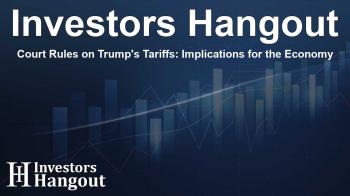Court Rules on Trump's Tariffs: Implications for the Economy

U.S. Appeals Court Decisions and Tariff Implications
A significant ruling emerged from a U.S. appeals court, declaring that many tariffs imposed by President Donald Trump are unconstitutional. This decision came as a surprise to many and has sparked a wave of reactions, especially from the ex-president, who labeled it as 'highly partisan'. Economists and political analysts are now reflecting on the broader implications of this ruling.
Understanding the Court's Rationale
The appellate court, in a closely divided 7-4 decision, concluded that Trump had overstepped his authority. The use of the International Emergency Economic Powers Act (IEEPA), intended for sanctions and asset freezes, was deemed a misapplication. Historically, this act has not contained provisions allowing the president to levy tariffs, according to the court's analysis.
Current Status of Tariffs
Despite this decision, the tariffs applied against nations such as China, Canada, and Mexico, which were established in early 2024, will remain in effect while Trump’s administration seeks an appeal from the Supreme Court. The court clearly stated that the statutory powers granted to the President did not encompass imposition of tariffs or taxation. This context is crucial as it defines the extent of executive power in economic matters.
Trump's Reaction to the Ruling
In response to the court’s ruling, Trump expressed vehement dissatisfaction on social media platforms. He warned that dismantling these tariffs would have catastrophic effects on the country, further asserting his commitment to fighting the decision. He proclaimed, 'ALL TARIFFS ARE STILL IN EFFECT! With the United States Supreme Court's aid, we aim to bolster our nation's wealth and power!'
Expert Opinions on the Ruling
Economist Justin Wolfers clarified that the ruling does not prohibit tariffs but emphasizes the need for Congress to be involved in decisions related to tariffs. He argued that this ruling encourages a dialogue with legislative authorities before imposing such economic measures, highlighting a shift towards a more collaborative process in economic policy-making.
Market Reactions and Perspectives
The deliberation of the court, its judgments, and the final outcomes are closely monitored by market analysts. Governor Gavin Newsom of California remarked on social media about the ruling, signaling a possible shift in political sentiments regarding Trump's policies. Meanwhile, hedge fund manager Spencer Hakimian mentioned that the Supreme Court’s decision could potentially 'save the country' depending on how the judicial process evolves.
Looking Ahead: What This Means for Future Tariffs
While the immediate reactions from the markets were muted, industry experts are cautioning that there is an air of uncertainty that pervades the economic landscape following this ruling. Analysts believe the administration anticipated this outcome and may utilize alternative legal frameworks to maintain tariff structures while navigating through these complexities. The impact of the ruling may prompt Congress to re-evaluate their stance on tariffs and other economic controls moving forward.
Frequently Asked Questions
What did the U.S. Appeals Court rule regarding Trump's tariffs?
The court ruled that most of Trump's tariffs were unconstitutional, emphasizing that he exceeded his authority.
What is the International Emergency Economic Powers Act?
The IEEPA is a statute that historically permits the president to impose sanctions but does not explicitly allow for tariff imposition.
How did Trump respond to the court's ruling?
Trump condemned the ruling as 'highly partisan' and warned that removing tariffs could harm the economy.
What do economists say about the ruling?
Economists like Justin Wolfers noted that the ruling requires congressional involvement before tariffs can be imposed.
What does the future hold for tariffs in the U.S.?
Experts suggest the administration might explore different legal avenues to maintain current tariffs, adding uncertainty to future economic policies.
About The Author
Contact Owen Jenkins privately here. Or send an email with ATTN: Owen Jenkins as the subject to contact@investorshangout.com.
About Investors Hangout
Investors Hangout is a leading online stock forum for financial discussion and learning, offering a wide range of free tools and resources. It draws in traders of all levels, who exchange market knowledge, investigate trading tactics, and keep an eye on industry developments in real time. Featuring financial articles, stock message boards, quotes, charts, company profiles, and live news updates. Through cooperative learning and a wealth of informational resources, it helps users from novices creating their first portfolios to experts honing their techniques. Join Investors Hangout today: https://investorshangout.com/
The content of this article is based on factual, publicly available information and does not represent legal, financial, or investment advice. Investors Hangout does not offer financial advice, and the author is not a licensed financial advisor. Consult a qualified advisor before making any financial or investment decisions based on this article. This article should not be considered advice to purchase, sell, or hold any securities or other investments. If any of the material provided here is inaccurate, please contact us for corrections.

